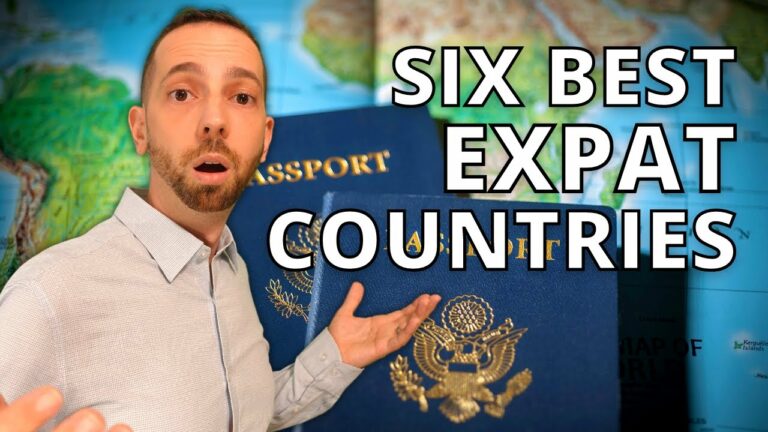Citizenship by Descent: Golden Visa Reviews | Residency and Investment
Have you ever thought about the possibility of being a citizen of a country without ever setting foot in it? Citizenship by descent is a little-known concept that can grant you citizenship in a country where your ancestors were born. As a blog traveller who has lived and traveled abroad extensively, I have come across many individuals who have obtained citizenship by descent, and the benefits it provides are often overlooked.
My own personal experiences have shown me the value of citizenship by descent. As the grandson of Italian immigrants, I was able to obtain Italian citizenship by descent, which has allowed me to live and work within the European Union without worrying about visa restrictions. This has opened up a world of opportunities for me, both professionally and personally.
Citizenship by descent is not only limited to European countries, but also to many others around the world. Many countries have laws that allow for citizenship to be passed down to children, grandchildren, and even great-grandchildren, regardless of where they were born. For example, individuals with Irish ancestry may be eligible for Irish citizenship, and those with Polish ancestry may be eligible for Polish citizenship.
The process of obtaining citizenship by descent can be complex and time-consuming, but with the right guidance and knowledge, it can be a rewarding and life-changing experience. In this blog, we will dive into the legal aspects of citizenship by descent, explore the benefits it can provide, and provide practical tips for those interested in pursuing this unique opportunity. So let’s explore the world of citizenship by descent and discover the possibilities it holds.
What does descent mean in citizenship?
When it comes to citizenship, there are several ways to acquire it. One of those ways is through descent, which is also known as jus sanguinis. Citizenship by descent means that an individual can claim citizenship of a country based on their parents, grandparents, or even great-grandparents’ nationality.
For example, if your father is a citizen of the United States, then you may be able to claim American citizenship even if you were born outside of the country. This is because citizenship by descent recognizes that nationality is passed down through bloodline rather than just place of birth.
Benefits of citizenship by descent
There are several benefits to obtaining citizenship by descent. Firstly, it can provide individuals with the opportunity to live and work in a new country without having to go through the lengthy process of applying for citizenship. It can also make it easier to obtain a long-term visa, which can lead to residency and, ultimately, citizenship.
Another advantage of citizenship by descent is that it can make it easier to obtain dual citizenship. Dual citizenship allows an individual to hold two passports from two different countries, which can be useful for travel, work, and investment opportunities. It also ensures that an individual has a backup plan in case they need to leave their home country due to political or economic instability.
How to obtain citizenship by descent
The process for obtaining citizenship by descent varies from country to country. For some nations, such as Italy and Ireland, the process is relatively straightforward. For others, it can be more complicated, requiring individuals to provide extensive documentation and evidence of their ancestry.
It’s important to note that some countries impose restrictions on citizenship by descent. For example, Germany imposes a 10-year time limit on individuals seeking to claim citizenship through their German ancestors. Other countries, such as Australia and Canada, may require individuals to have maintained a certain level of connection to the country throughout their lives.
Final thoughts
Citizenship by descent can be a great option for individuals looking to obtain citizenship in a new country. With the right documentation and evidence, it can make it easier to live and work abroad, obtain dual citizenship, and have a backup plan in case of political or economic instability in one’s home country. However, it’s important to research the specific requirements and restrictions of each country to ensure that the process goes as smoothly as possible.
How do I get citizenship by descent?
If you are interested in obtaining citizenship in a new country, you may already be aware of the various routes that can lead you there. One option you may not have considered is citizenship by descent, which allows individuals to become citizens of a country based on their familial ties to that nation.
The process of obtaining citizenship by descent varies from country to country, but generally involves proving a direct ancestral connection to the country in question. In this article, we will explore the steps involved in obtaining citizenship by descent and provide tips for making the process as smooth as possible.
Step 1: Research Your Ancestry
Before beginning the process of obtaining citizenship by descent, it is essential to research your ancestry and determine if you have a direct familial connection to the country in question. This may involve researching your family tree, contacting relatives for information, or hiring a genealogist to assist you.
Once you have established your familial connection to the country, you will need to gather documentation to support your claim.
Step 2: Gather Documentation
To apply for citizenship by descent, you will typically need to provide documentation that proves your ancestral connection to the country. This may include birth, marriage, and death certificates, as well as other relevant documents, such as passports or naturalization papers.
It is essential to ensure that all documentation is current, accurate, and officially translated into the language of the country in question. Incomplete or inaccurate documentation can delay or even prevent the citizenship application process.
Step 3: Submit Your Application
Once you have gathered all necessary documentation, you can submit your citizenship application to the relevant government agency or department. Depending on the country and your individual circumstances, the application process may involve an interview, background checks, or other requirements.
Be prepared to wait for a response, as the citizenship application process can take several months or even years, depending on the country’s laws and regulations.
Step 4: Attend an Interview
In some cases, applicants for citizenship by descent may be required to attend an interview with government officials to discuss their application and answer any questions they may have. This interview may take place in person or via video conference, depending on the country’s policies.
Step 5: Receive Your Citizenship
If your citizenship application is approved, you will receive your new citizenship documentation, which may include a passport or national identification card. Congratulations, you are now a citizen of your ancestral homeland!
Tips for Obtaining Citizenship by Descent
– Research your ancestry thoroughly before beginning the application process.
– Make sure all documentation is accurate, up-to-date, and officially translated.
– Be patient and expect the process to take time.
– Consider hiring a lawyer or immigration specialist to assist you with the process.
– Be prepared to attend an interview if required.
– Embrace your new citizenship and learn as much as you can about your ancestral culture and traditions.
By following these steps and tips, you can successfully navigate the process and become a citizen of your chosen country.
What is the easiest citizenship by ancestry?
If you’re looking to become a citizen of a country, you may want to consider exploring the option of citizenship by descent. This is when you can claim citizenship of a country because one or both of your parents or grandparents were citizens of that country. Citizenship by descent is a popular way for individuals to obtain citizenship, as it offers a relatively straightforward process and may provide access to benefits like healthcare, education, and travel.
Which countries offer citizenship by descent?
Many countries around the world offer citizenship by descent, including popular expat destinations like Italy, Ireland, Poland, and Hungary. Each country has its own set of rules and requirements for citizenship by descent, so it’s important to do your research and understand the process before pursuing this option.
What is the easiest citizenship by ancestry?
While there’s no definitive answer to which country offers the easiest citizenship by ancestry, some countries have more lenient requirements than others. For instance, Ireland allows individuals to claim citizenship by descent if they can prove that one of their grandparents was an Irish citizen. Italy offers citizenship by descent to individuals with Italian ancestors, regardless of how far back the lineage goes.
Another country that many people consider for citizenship by descent is Poland. Poland offers citizenship to individuals with Polish ancestors, although the process can be more complex than it is in some other countries. Additionally, Hungary offers citizenship to individuals with Hungarian ancestors, although again, the requirements can be more stringent than in other countries.
What are the benefits of citizenship by descent?
There are many benefits to obtaining citizenship by descent. For one, it may provide you with access to healthcare, education, and other social services in your country of citizenship. Additionally, it may make it easier for you to work and travel within the country and may even provide you with the ability to vote in local elections.
Ultimately, the decision to pursue citizenship by descent is a personal one that depends on your individual circumstances and goals. However, if you have ancestry in a country that offers citizenship by descent, it’s worth exploring this option to see if it’s right for you.
Can I get citizenship through DNA test?
Many individuals are interested in obtaining citizenship in a new country. Some may qualify for citizenship through a process known as “citizenship by descent”. This process involves proving a familial connection to a citizen or former citizen of a particular country. However, some may wonder if they can obtain citizenship through a DNA test. Let’s dive into this topic and explore if it’s possible.
Understanding Citizenship by Descent
Citizenship by descent, also known as jus sanguinis, is a legal concept that allows an individual to claim citizenship in a country based on their familial connection to a citizen or former citizen of that country. This process is often available for those who have a parent, grandparent, or even great-grandparent who was a citizen of a particular country. The specifics of this process can vary between countries and may involve proving the familial connection through documentation such as birth certificates and marriage certificates.
Can DNA Testing Be Used to Prove Citizenship by Descent?
While DNA testing has become increasingly popular for ancestry and genealogy purposes, it is not typically used as a primary means of proving citizenship by descent. This is because DNA testing cannot definitively prove the existence of a familial relationship. DNA testing can provide evidence to support a claim of a familial relationship, but it cannot conclusively prove it.
Many countries have specific requirements for proving citizenship by descent, and DNA testing may not be accepted as a valid form of proof. It’s important to research the specific requirements for the country you are interested in obtaining citizenship from and determine what documentation is required.
Practical Tips for Obtaining Citizenship by Descent
If you are interested in obtaining citizenship by descent, there are some practical tips to consider:
- Research the specific requirements for the country you are interested in obtaining citizenship from.
- Gather all necessary documentation, such as birth certificates and marriage certificates. If you are missing documentation, consider reaching out to government agencies or embassies for assistance.
- Consider hiring a lawyer or immigration specialist to assist with the process.
- Be prepared for a potentially lengthy and complex process. Citizenship by descent can involve navigating different legal systems and may require translations of documents.
citizenship by descent can be a valuable opportunity for those seeking to establish a connection with their ancestral roots or expand their global citizenship options. However, the process can vary greatly depending on the country and the specific requirements involved. It is essential to conduct thorough research, seek professional advice, and understand the legal implications before embarking on this journey. Moreover, becoming a citizen by descent offers not only practical advantages but also a deeper sense of belonging and connection to one’s heritage. As expats, we have the privilege of exploring and embracing diverse cultures and experiences, and citizenship by descent can be a valuable tool to enrich our lives and broaden our horizons.






